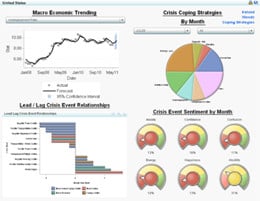The United Nations Global Pulse, along with analytics software specialist SAS, has revealed how social media streams can be used as predictors of national unemployment line spikes.
By analysing more than half a million blogs, forums and news sites, the researchers were able to determine how social media chatter more specifically the 'conversation sentiment' expressed by it, could warn of pending unemployment increases as well as help to inform government policymakers of the likely impact of those increases.
 The data analysed came from more than two years worth of social media streams in both the USA and Ireland, and was checked for any references to unemployment and how people hit by it were coping. By using a process of mood scores and conversation volume comparison to the official unemployment statistics in both countries, SAS and the UN Global Pulse researchers were able to determine that increased chatter about 'cutting back' and 'public transportation usage' as well as 'downgrading the car' were positive indicators in predicting an unemployment spike.
The data analysed came from more than two years worth of social media streams in both the USA and Ireland, and was checked for any references to unemployment and how people hit by it were coping. By using a process of mood scores and conversation volume comparison to the official unemployment statistics in both countries, SAS and the UN Global Pulse researchers were able to determine that increased chatter about 'cutting back' and 'public transportation usage' as well as 'downgrading the car' were positive indicators in predicting an unemployment spike.
Following such a spike, the research showed that social media conversations about holiday cancellations and mortgage foreclosures or eviction surged. OK, maybe that is predictable without doing the social media analysis, but it does nonetheless flag the economic effects of employment downturns as reflected within the social media sphere and could be useful for policymakers looking to mitigate the negative effects of increased unemployment according to the UN Global Pulse team at any rate.
UN Secretary-General Ban Ki-moon reckons that “he private sector is analysing this new data to understand its customers in real-time. Much of this data contains signals that are relevant to development. We must use it to tell us what is happening, while it is happening.”
While it is happening often means before it is reported. So, in the US for example, a rise in hostile or depressed chatter occurred some four months before an unemployment spike showed up in the national stats. In Ireland, meanwhile, increases in anxious social media conversation correlated with a spike five months further along the road while confused chat happened three months ahead of the spike.
“Social media and Internet content is like the letters and phone calls that have always informed organisations. Only now, it’s digital, public and massive in scale. This untapped treasure can provide real-time feedback on policies, improve public safety, enhance citizen relations and support important sociological research,” said I-sah Hsieh, global manager, International Development, SAS.
